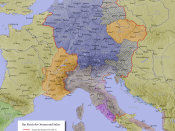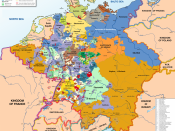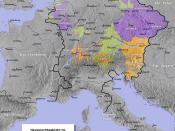The German people were ecstatic about the founding of the German Reich in 1871, after having been fragmented and controlled by neighbouring powers for the previous 600 years since the time of Frederic Barbarossa . The euphoria and sentiments were not shared by many of the German Reich's neighbours due to various reasons. It is clear that Germany's future neighbours were profoundly adamant that Germany remain divided. They did not want the more than 30 fragmented pieces to unite under one German government because of their own political and territorial interests. To understand this, it is necessary to review the reasons for past disunity of the various German states, then explain the advantages that a disunited Germany presented to its neighbours, and to recognise the five key countries and their respective interests in having control over the affairs of parts of Germany.
Since the time of the Barbarian Invasions of the 4th and 5th centuries , Germanic tribes were often in a state of war and neighbourly aggression .
It was not until the reign of Charles the Great that vast German territory was united and that tribal rivalry was put to an end. After his death, however, the empire of Charles the Great was divided among his three sons forming the portions that gave rise to the Frank Empire in the west, established the domains out of which grew the Burgundian and future Italian states, and formed the lands that were the predecessor of a German Empire in the northern and eastern parts of the disintegrating Carolingian Empire .
The third part of Charles the Great's Empire gained unity in a German Nation called "The Holy Roman Empire of German Nations" more than 150 years later under the reign of Otto I. Once again, this empire did provide lasting...


